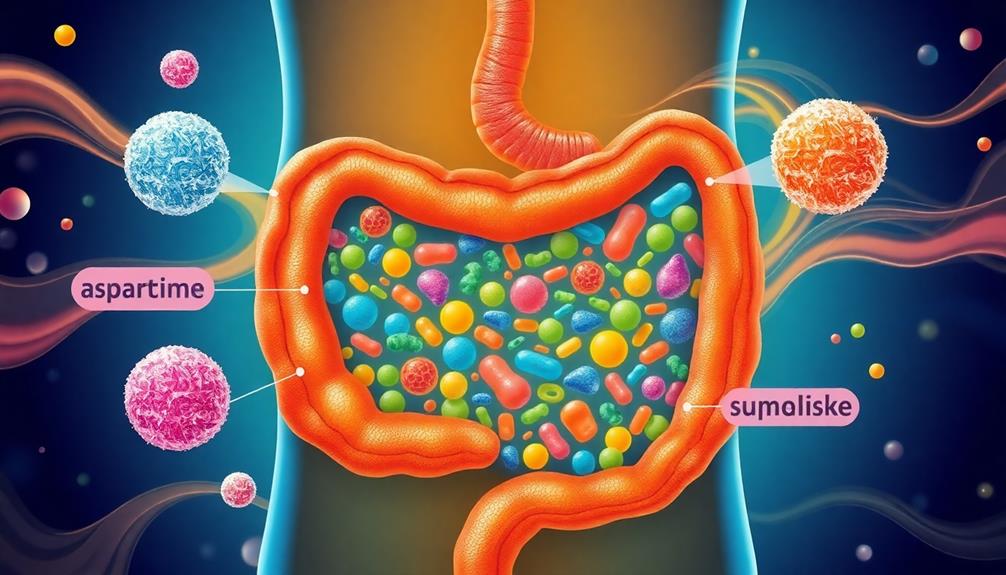Artificial sweeteners, like aspartame and sucralose, can greatly change your gut bacteria, which might impact your overall health and metabolism. Research shows that these sweeteners can lead to alterations in your gut microbiome, potentially impairing glucose tolerance and disrupting metabolic functions. The balance between healthy and unhealthy gut bacteria could be affected, contributing to issues like insulin sensitivity. Your individual response to these sweeteners varies, influenced by your unique microbiome. If you're curious about the specific mechanisms involved and the potential long-term health effects, there's more to uncover about their influence on your gut health.
Key Takeaways
- Artificial sweeteners can significantly alter the composition of gut microbiota, leading to potential metabolic disturbances.
- Changes in gut bacteria from sweeteners may impair glucose tolerance and affect blood sugar regulation.
- Sweeteners can disrupt the Firmicutes/Bacteroidetes ratio, which is linked to metabolic health issues.
- Individual responses to artificial sweeteners vary, influenced by unique microbiome profiles and dietary habits.
- Research indicates that artificial sweeteners may contribute to dysbiosis, which is associated with various health problems.
Overview of Artificial Sweeteners
Artificial sweeteners have become a popular alternative to sugar, offering sweetness without the calories. Since their introduction in the late 1800s, these non-nutritive sweeteners, like saccharin and sucralose, have gained traction among those looking to reduce sugar intake.
However, recent research raises questions about their long-term effects on gut microbiota and metabolic health. In addition to sweetening foods and beverages, these sweeteners are increasingly integrated into various culinary creations, including innovative dishes like Mushroom Masala that provide flavorful options without added sugars.
When you consume artificial sweeteners, they don't just pass through your system unnoticed. Studies show they can notably alter your gut microbiota composition, which might impact your glucose tolerance.
For example, saccharin and sucralose have been linked to changes in how your body regulates blood sugar levels. These effects can vary widely from person to person, suggesting that not everyone will respond the same way to these sweeteners.
Initial animal studies have established a potential link between sweetener consumption, gut bacteria changes, and impaired glucose regulation. This connection warrants further investigation in humans to understand how artificial sweeteners might influence metabolic health.
As you consider adding these sweeteners to your diet, it's essential to remain aware of the emerging evidence surrounding their effects.
Understanding Gut Microbiota
Your gut microbiota is a bustling community of over 1500 bacterial species, playing an essential role in your digestion and overall health.
Maintaining a balance between eubiosis and dysbiosis is imperative, as dietary choices can greatly influence this state.
For instance, incorporating seasonal ingredients like those found in Nettle and Potato Soup can promote microbial diversity.
Microbial Diversity Importance
Recognizing the significance of microbial diversity is essential for understanding gut health. Your gut microbiota consists of over 1500 species, with a balance between dominant species being important. When microbial diversity is high, it supports a robust gut ecosystem, while a lack of diversity can lead to dysbiosis, which is linked to various health issues.
Notably, just as diverse flavors in dishes like Red-Braised Pork Belly contribute to a rich culinary experience, a varied diet promotes a diverse gut microbiome.
Here are key reasons why microbial diversity matters:
- Digestive Health: A diverse gut microbiota aids in breaking down food and absorbing nutrients.
- Immune Function: It plays a critical role in regulating the immune system and defending against pathogens.
- Metabolic Balance: A balanced gut can help maintain a healthy weight and reduce the risk of obesity.
- Inflammation Reduction: High diversity can lower the chances of inflammatory bowel disease and other inflammatory conditions.
- Dietary Influences: Your diet shapes microbial diversity; diets rich in fiber promote beneficial gut bacteria.
Fostering microbial diversity through dietary choices is essential for maintaining a healthy gut. Understanding these influences can help you make informed decisions about your health.
Eubiosis vs. Dysbiosis
The gut microbiota plays an essential role in maintaining health, reflecting a delicate balance between eubiosis and dysbiosis. Eubiosis represents a harmonious state, where a diverse composition of microbial species works together to support your digestion, metabolism, and immune function.
In contrast, dysbiosis indicates an imbalance in this microbial community, often linked to health issues like obesity and inflammatory bowel disease (IBD). A well-balanced diet, similar to traditional Ethiopian meals that incorporate fresh vegetables and whole grains, can help foster eubiosis and promote gut health, showcasing the importance of diverse food choices in our diets Ethiopian salad ingredients.
Your gut microbiota consists of over 1500 species, mainly Firmicutes and Bacteroidetes. An increased Firmicutes/Bacteroidetes (F/B) ratio is typically associated with obesity, while a higher abundance of Bacteroidetes can correlate with disorders like IBD and other metabolic issues.
When you consume diets high in sugar and fat, you risk promoting dysbiosis, which negatively impacts microbial diversity, leading to the growth of pathogenic bacteria.
Emerging research suggests that artificial sweeteners may disrupt this balance, altering gut microbiota composition and contributing to dysbiosis. This shift can greatly affect your metabolic health and glucose tolerance.
Dietary Influences on Microbiota
Dietary choices considerably shape gut microbiota, influencing not only microbial composition but also overall health. Your dietary patterns play a pivotal role in determining the balance of bacteria in your gut. For instance, sugar-rich diets can lead to dysbiosis, where harmful bacteria outnumber beneficial ones, negatively impacting your health.
Incorporating diverse ingredients, such as those found in Brazilian cuisine, can offer nutritional benefits that support a balanced microbiome.
Here are some key influences of diet on gut microbiota:
- High-protein and high-fat diets can shift the microbial composition.
- Increased Firmicutes/Bacteroidetes (F/B) ratio is linked to obesity.
- Lower Bacteroidetes ratio correlates with inflammatory conditions.
- Early dietary exposure, especially breastfeeding, supports beneficial microbes.
- Diets rich in simple sugars may cause bacterial overgrowth and reduce diversity.
Ultimately, maintaining a balanced F/B ratio is essential for gut homeostasis. By making mindful dietary choices, you can promote a healthier gut microbiota, which may help prevent conditions such as obesity and inflammatory bowel disease.
Recognizing the impact of what you eat on your gut health empowers you to make better decisions for your overall well-being.
Effects on Gut Health
Altering gut health through the consumption of artificial sweeteners has become a pressing concern in recent research. Studies show that non-nutritive sweeteners (NNS) like saccharin and sucralose can notably change the gut microbiome, which may lead to glucose intolerance.
Curiously, the delicate balance of gut bacteria is essential for overall health, much like the harmony found in dishes such as Dorayaki, which blend simple ingredients into a delightful treat. When you consume these sweeteners, your gut bacteria may respond differently, affecting your overall gut health and even your blood sugar levels.
Research published in *Cell* indicates that these changes in gut microbe composition are linked to altered glycemic responses in individuals. If you've ever experienced fluctuations in blood sugar after consuming sweeteners, it's not just your imagination.
Participants in studies showed that consuming NNS led to measurable changes in their gut microbiota, which were reflected in glucose tolerance tests.
Moreover, experiments with germ-free mice revealed that transferring microbiomes from individuals who'd adverse reactions to sweeteners caused similar glycemic changes. This establishes a clear link between gut bacteria and glucose regulation.
Given the complexity of individual responses, personalized dietary recommendations are essential, as the effects of sweeteners on gut health can vary greatly from one person to another.
Mechanisms of Action
When you consume artificial sweeteners, your body reacts in ways that can change how your gut bacteria function.
These sweeteners can disrupt the balance of your microbiome, similar to how certain dietary choices in Asian Cuisine influence gut health.
These changes can impact your metabolism and blood glucose responses, often leading to noticeable differences in your overall health.
Understanding these mechanisms is essential for grasping the full impact of sweeteners on your gut microbiome.
Sweetener Metabolism Effects
Artificial sweeteners, like aspartame and sucralose, play a significant role in how your body processes these non-nutritive substances. Since these sweeteners aren't fully absorbed, they undergo metabolism that can influence your gut health and overall metabolism.
Notably, just as traditional dishes like Muamba De Galinha are rich in flavor and impactful on cultural traditions, sweeteners can have profound effects on the composition of gut bacteria. Research suggests that consuming sweeteners can alter your gut microbiome, impacting glucose regulation.
Here are some key effects of sweetener metabolism:
- They can change the Firmicutes/Bacteroidetes ratio in your gut, which is essential for metabolic health.
- Specific sweeteners, like saccharin, have been shown to affect glucose tolerance, indicating their role in metabolic processes.
- Mice studies indicate that sweeteners can lead to impaired glucose regulation, linking them to metabolic issues.
- The metabolic response to sweeteners can differ from person to person, highlighting the importance of personalized dietary recommendations.
- Understanding your unique microbiome profile may help you make better choices regarding sweeteners.
Gut Microbiota Alterations
Frequently, the consumption of artificial sweeteners leads to notable alterations in gut microbiota composition. Research shows that even within 14 days of consuming sweeteners like saccharin and sucralose, significant changes in bacterial populations occur.
You may not realize that these non-nutritive sweeteners can specifically influence the Firmicutes/Bacteroidetes (F/B) ratio, which is vital for maintaining gut homeostasis. Disruptions in this ratio can potentially lead to metabolic disturbances, much like how spooky snacks alter festive gatherings.
For instance, sweeteners like aspartame may increase total bacteria and alter microbial diversity, impacting your glucose metabolism and tolerance. In randomized controlled trials, participants consuming these sweeteners exhibited distinct changes in their gut microbiome, which correlated with altered glycemic responses during glucose tolerance tests.
Moreover, experiments with germ-free mice confirm that microbiome changes induced by artificial sweeteners can impair glucose regulation. This evidence suggests a direct link between sweetener consumption, gut bacteria, and metabolic health.
Therefore, if you're consuming artificial sweeteners, it's important to be aware of how they might be reshaping your gut microbiota and influencing your overall health.
Blood Glucose Responses
Research indicates that non-nutritive sweeteners (NNSs) can greatly affect blood glucose responses, primarily through their influence on gut microbiota.
When you consume sweeteners like saccharin or sucralose, they can alter the composition of gut microbes, which may then impact how your body regulates blood glucose levels. This interplay can be essential for maintaining glycemic control and preventing conditions like metabolic syndrome.
Interestingly, just as classic dishes like a Loaded Baked Potato exemplify the comfort of American cuisine, the balance of gut bacteria is fundamental for overall health.
Key points to take into account include:
- NNS consumption can lead to significant changes in blood glucose during tolerance tests.
- Altered gut microbiota may impair insulin sensitivity.
- A study with over 1,300 participants found microbial shifts linked to sweetener intake.
- Germ-free mice inoculated with NNS-associated microbiota displayed poor glucose regulation.
- Individual responses to sweeteners vary, indicating personalized dietary approaches may be necessary.
Understanding these mechanisms is crucial for making informed choices about sweeteners and their potential effects on your health.
Individual Variability in Responses
Many people experience different responses to artificial sweeteners, which can considerably impact gut bacteria composition. This individual variability means that not everyone will react the same way to the same sweeteners.
Research shows that some individuals might see increased blood glucose peaks after consuming specific non-nutritive sweeteners. These varied metabolic responses highlight how your unique microbiome and pre-existing gut bacteria profiles play an essential role in how sweeteners affect your metabolism.
For instance, germ-free mice receiving microbiomes from "top responders" displayed impaired glucose regulation, illustrating that individual gut bacteria can drive different metabolic outcomes. This emphasizes the importance of understanding your own microbiome when considering artificial sweeteners.
Given the complexity of gut bacteria interactions, personalized dietary recommendations become vital. By tailoring your sweetener intake based on your specific gut microbiome profile, you can optimize health outcomes.
Ultimately, recognizing that artificial sweeteners may not affect everyone in the same way can help you make informed choices about your diet and health.
Current Research Findings
As studies continue to explore the effects of artificial sweeteners on gut bacteria, findings reveal notable alterations in microbiota composition that can influence glucose tolerance and metabolism.
Research indicates that sweeteners like saccharin and sucralose can lead to remarkable changes in your gut microbiota, potentially impacting your overall health.
Key findings from recent studies include:
- Altered Microbiota: Individuals consuming artificial sweeteners show distinct changes in their gut microbiome compared to those who don't.
- Glucose Regulation: Changes in gut bacteria can impair glucose tolerance, affecting how your body processes sugar.
- Blood Sugar Levels: Non-nutritive sweeteners are linked to fluctuations in blood sugar, emphasizing their metabolic impact.
- Germ-Free Studies: Research involving germ-free mice demonstrated that the microbiomes of sweetener consumers could disrupt glucose regulation when transferred.
- Personalized Effects: Variability in individual responses suggests that the health effects of artificial sweeteners can differ considerably among people.
These findings underline the importance of understanding how artificial sweeteners interact with gut microbiota and their potential consequences on metabolism and health.
Further investigation is essential for grasping the full extent of these personalized effects.
Future Research Directions
Looking ahead, scientists aim to dive deeper into the intricate relationship between artificial sweeteners and gut microbiota. Future research will focus on identifying specific gut microbes linked to sweetener-induced glucose intolerance and understanding their mechanisms of action.
You'll want to keep an eye on studies that explore the long-term health effects of artificial sweeteners on gut microbiota, as these findings could have significant implications for metabolic health.
Moreover, researchers plan to develop personalized dietary recommendations based on individual microbiome profiles in response to sweetener consumption. This personalized approach could help you make more informed choices regarding your diet.
There's also a pressing need for extensive human trials to confirm causation between artificial sweeteners and alterations in gut bacteria, as well as their subsequent impact on glycemic responses.
Lastly, it's essential to grasp the broader health implications of artificial sweeteners. Understanding how they may affect gut microbiome diversity and function over time will be key to evaluating their overall impact on your health.
This line of inquiry promises to reshape how we view artificial sweeteners and their role in our diets.
Frequently Asked Questions
Do Artificial Sweeteners Disrupt Gut Bacteria?
Yes, artificial sweeteners can disrupt your gut bacteria. When you consume them, you might notice changes in your microbiome, affecting your metabolism and glucose tolerance, which could lead to unexpected health issues over time.
Do Artificial Sweeteners Cause a Leaky Gut?
Imagine a dam weakening with every artificial sweetener you consume. You might find that these sweeteners disrupt your gut's integrity, potentially leading to a leaky gut, impacting your overall health and wellness considerably.
Is Artificial Sweetener Bad for Your Stomach?
Artificial sweeteners might not be bad for your stomach, but they can lead to digestive discomfort in some people. It's important to pay attention to how your body reacts and adjust your intake accordingly.
Does Coke Zero Affect Gut Bacteria?
When it comes to Coke Zero, you might find it's a double-edged sword. It can alter your gut bacteria, possibly impacting your metabolism. Keep an eye on how your body reacts to it.
Conclusion
So, while you might think swapping sugar for artificial sweeteners is a healthy choice, it turns out you could be stirring up a little chaos in your gut. Who knew that a calorie-free sweetener could be a gut's worst nightmare? As researchers dig deeper, you might just find that your quest for a guilt-free treat could lead to unexpected twists and turns in your digestive saga. Keep those probiotics handy—you might need them after all!










